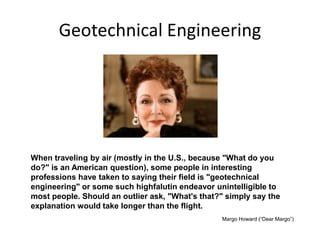The Facts About Geotheta Uncovered
How Geotheta can Save You Time, Stress, and Money.
Table of ContentsGeotheta for BeginnersThe Buzz on GeothetaSome Known Factual Statements About Geotheta Rumored Buzz on Geotheta7 Simple Techniques For Geotheta

They perform website examinations, gather examples, carry out laboratory examinations, and evaluate information to evaluate the suitability of the ground for construction tasks - Geotechnical Engineers. Based upon their searchings for, geotechnical designers supply referrals for foundation layout, slope stability, preserving frameworks, and mitigation of geotechnical hazards. They collaborate with various other specialists, such as architects, architectural engineers, and building groups, to guarantee that geotechnical considerations are integrated right into the general job style and implementation
By assessing the actions and homes of soil and rock, they can recognize potential geotechnical dangers such as landslides, dirt negotiation, or slope instability. Their knowledge helps prevent failures or crashes that could endanger lives and property. Here are some thorough responsibilities and duties of a geotechnical engineer: Site Investigation: Geotechnical designers conduct website examinations to gather data on subsurface conditions.
They translate the data to recognize the residential properties and behavior of the dirt and rock, including their stamina, permeability, compaction features, and groundwater conditions. Geotechnical Analysis and Design: Geotechnical engineers evaluate the data gathered during website investigations to examine the security and viability of the site for construction jobs. They perform geotechnical estimations and modeling to assess elements such as birthing capacity, settlement, slope stability, side planet stress, and groundwater flow.
Not known Incorrect Statements About Geotheta
Structure Style: Geotechnical designers play a vital duty in creating foundations that can securely support the desired structure. They analyze the soil problems and load requirements to establish the suitable foundation kind, such as superficial foundations (e.g., footings), deep foundations (e.g (https://www.tripadvisor.in/Profile/geotheta1)., piles), or specialized techniques like soil improvement. They consider factors such as settlement limits, bearing capacity, and soil-structure interaction to develop optimal foundation styles
They review building plans, monitor site tasks, and conduct area inspections to verify that the style recommendations are adhered to. If unexpected geotechnical problems emerge, they analyze the scenario and supply suggestions for removal or changes to the style. Risk Analysis and Reduction: Geotechnical engineers examine geotechnical threats and risks connected with the job website, such as landslides, liquefaction, or soil disintegration.

Collaboration and Communication: Geotechnical designers function closely with other experts involved in a task, such as engineers, architectural engineers, and building teams. Reliable interaction and collaboration are necessary to integrate geotechnical factors to consider into the total job style and building and construction procedure. Geotechnical engineers give technological expertise, response queries, and guarantee that geotechnical demands are met.
Everything about Geotheta
Below are some types of geotechnical engineers: Foundation Designer: Foundation designers concentrate on creating and analyzing structures for frameworks. They analyze the soil problems, load requirements, and site attributes to determine one of the most proper foundation type and style, such as superficial foundations, deep foundations, or specialized strategies like heap foundations.
They review the aspects affecting incline stability, such as soil residential properties, groundwater problems, and slope geometry, and develop methods to stop incline failures and mitigate threats. Quake Designer: Earthquake designers specialize in examining and creating structures to endure seismic forces. They analyze the seismic hazard of a site, assess dirt liquefaction possibility, and create seismic design requirements to make certain the safety and security and resilience of structures during earthquakes.
They perform field screening, gather examples, and analyze the collected information to identify the dirt buildings, geologic formations, and groundwater conditions at a website. Geotechnical Instrumentation Engineer: Geotechnical instrumentation engineers concentrate on monitoring and determining the habits of dirt, rock, and frameworks. They install and maintain instrumentation systems that keep track of elements such as soil negotiation, groundwater levels, incline movements, and structural variations to examine efficiency and give early warnings of potential issues.
All about Geotheta
They carry out tests such as triaxial examinations, consolidation examinations, straight shear tests, and leaks in the structure tests to gather information for geotechnical analysis and design. Geosynthetics Engineer: Geosynthetics designers concentrate on the layout and application of geosynthetic materials, such as geotextiles, geogrids, and geomembranes. They make use of these materials to boost soil stability, reinforce inclines, provide water drainage options, and control disintegration.
They have a tendency to be investigatory individuals, which implies they're intellectual, introspective, and analytical. They are interested, systematic, reasonable, analytical, and rational. Some of them are likewise social, meaning they're kind, generous, cooperative, client, caring, practical, understanding, sensible, and pleasant - Geo Tech Engineering.
In the office setting, geotechnical engineers utilize specialized software tools to carry out computations, develop styles, and evaluate information. look at this web-site They prepare reports, review job specifications, interact with clients and group members, and coordinate task activities. The workplace setup provides a conducive setting for research, analysis, and partnership with various other experts included in the task.
The smart Trick of Geotheta That Nobody is Talking About
They often visit job websites to perform site examinations, examine geotechnical conditions, and gather information for evaluation. These gos to entail taking a trip to various places, in some cases in remote or tough surfaces. Geotechnical engineers may perform dirt sampling, conduct examinations, and monitor building and construction activities to make sure that the geotechnical facets of the project are being carried out correctly.
Geotechnical designers likewise work in specialized geotechnical laboratories. Geotechnical lab engineers work thoroughly in these atmospheres, taking care of screening equipment, operating instruments, and taping information.